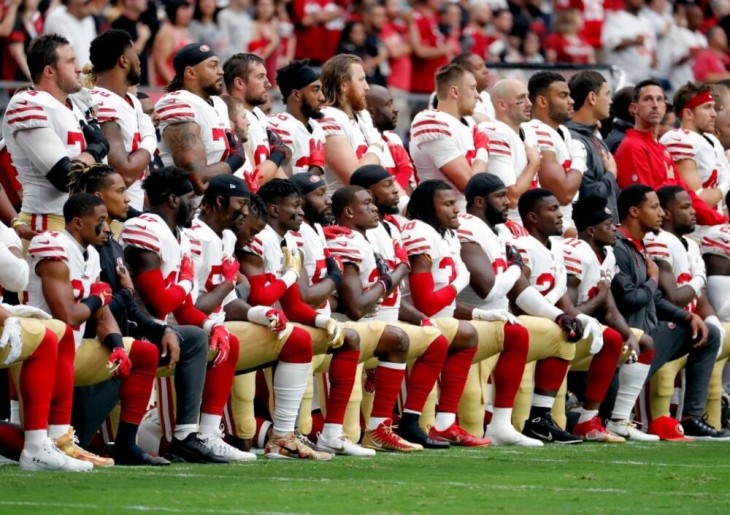Politics in sports
18.02.2022
Sports were already politicized. And sports culture is deeply conservative.
Our survey found sports fans are more likely to hold conservative views.

-
Members of the discussion:
-
Last reply:
Of all the unwritten “rules” in sports, broadcaster Howard Cosell believed it the cardinal decree: Sports and politics don’t mix. But as the events of the past few weekends have demonstrated, the reality is that was always a fantasy.
American sports culture is still — largely, if often invisibly — a conservative space. This will no doubt come as a surprise to fans, presidents and pundits enraged by the waves of NFL players and teams protesting during the national anthem — and to those who see some sort of nefarious liberal bias lurking among the sports media. But it is, nonetheless, borne out in our survey research that finds sports fans tend to harbor more right-leaning attitudes on economic and foreign policy issues, even as Republicans are no more likely than Democrats to follow most sports.
As big businesses, sports leagues and teams themselves are conservative in the sense of being “risk averse” and protecting a lucrative commercial product. One could, hypothetically, chart an inverse correlation between revenue flooding into the sports industry after the 1960s and the daring of activist athletes in those decades hence. As Michael Jordan emblematically (if apocryphally) said:
“Republicans buy sneakers, too.”
So when Colin Kaepernick started protesting police treatment of African Americans last year, it surely ignited panic among league and media executives who thought his movement would bring down NFL ratings and, thus, advertiser revenue. “Protest” isn’t a word that scares sports stakeholders; “boycott” is — whether from Kaepernick-haters or those who think he’s been blackballed. A $13 billion business has too much to lose from those taking a stand (or, rather, taking a knee).
But sports culture is also conservative in “substantive” political ways, most not often recognized as such. First and foremost, sports tell us fairly consistently — if not consistently fairly — that winners work hard and losers are lazy. That’s not an irrelevant message in era of economic inequality; you might even say that it helps determine your views on income taxation and government welfare.
Indeed, according to the results of a 1,000-person, nationally representative survey we fielded last fall — halfway through Kaepernick’s protest season — sports fans are more likely than non-fans to believe that wealth outcomes reflect meritocratic processes. Controlling for demographics and party identification, we found that those who followed sports closely were more likely to think that personal factors such as ambition and effort were more important than structural advantages such as hailing from a rich family or knowing the right people. (Because this was a survey and not an experiment, we can’t say sports fandom causes this conservatism, only that it correlates.) In our survey coding, for example, a one-unit change in fan intensity (as measured on a five-point scale) is associated with a .03 change (on a four-point scale) in those meritocratic attitudes.
Sports fans were also significantly more likely than non-fans to hold hawkish attitudes and support increased defense spending; here, a one-unit increase in fan intensity was associated with a .11 change in pro-military views (on a similar four-point scale). This may have been what the Pentagon was paying for with its $10 million in “guerrilla marketing” in the form of soldier tributes that were seemingly gratis and “authentic” but later revealed, in a congressional report, to have been financed by specific contractual line items.
That’s no surprise: Throughout world history, athletic activity has been seen as rehearsal for military action. Sports were a proxy for war in the ancient Greek and Roman era; the modern Olympics were revived to toughen up French youth for future battles. And President Dwight Eisenhower once declared:
“The true mission of American sports is to prepare young people for war.”
Finally, sports remain deeply conservative when it comes to gender norms or what scholars like to call hegemonic masculinity. Conservative anxieties about the “wussification” of football aside (how dare we care about their brains!), sports culture still demands and valorizes a pretty traditional form of manhood: tough, stoic, aggressive, disinclined to carry murses. Incidentally, this was also the second-most- troubling sports-related hot take that President Trump delivered in his recent Alabama speech: leering at and lusting for those CTE-inducing “beautiful tackles” that football players used to be allowed to endure.
Women, meanwhile, are still reliably marginalized in sports culture — as athletes (they average 2 to 3 percent of all sports coverage on local TV affiliates and ESPN) and as media professionals (where more than 90 percent of anchors, commentators and editors are men) and perhaps, because of that, as fans (where, we discovered, 35 percent of women say they don’t follow sports, as compared to just 19 percent of men).
I’m a white country singer. I still took a knee after I sang the national anthem at an NFL game.
None of these contexts are as recognizably “political” as an anthem spat between the president and the NFL Players Association. Rather, they’re baked in subtly: a fighter-jet flyover here; an Under Armour ode to hustle there; a debate about whether a horse or a woman should be named “Sports-person of the Year.” That these don’t extrude as explicit partisan fodder, though, doesn’t make them any less influential or enduring.
That said, Trump got one thing right: Sports fans don’t seem to like those politics intruding (however construed). The cascade of boos that rained down on dissenters at football games the past two weekends suggests this, and our national survey confirmed as much: Some 50 percent of respondents strongly or somewhat agreed with the statement that “Sports and politics should not mix” (compared with 20 percent who disagreed and 30 percent who neither agreed nor disagreed). Among those self-identifying as conservatives, the opposition to that politicization was even stronger — 62 percent as compared with 51 percent of moderates. Liberals did not evince the same recoil: Only 35 percent thought that sports and politics shouldn’t mix.
This is because the conservative politics already “within” sports are invisible and permissible, while those deemed “out of bounds” are left-leaning and illegitimate. If there’s going to be a culture war over sports going forward, the American right still has the home-field advantage.
Discussion
More on the topic
More on the topic






